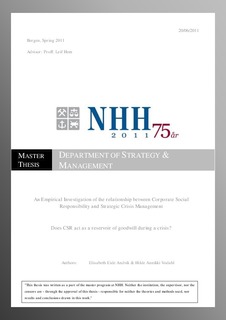An empirical investigation of the relationship between corporate social responsibility and strategic crisis management : does CSR act as a reservoir of goodwill during a crisis?
Master thesis
Permanent lenke
http://hdl.handle.net/11250/168957Utgivelsesdato
2011Metadata
Vis full innførselSamlinger
- Master Thesis [4372]
Sammendrag
Recent times have witnessed a proliferation of crises damaging corporate reputations as well as their stakeholders. In this context, the fields of Corporate Social Responsibility and Strategic Crisis Management are of increasing importance. The theoretical progression has evolved in parallel in different disciplines and research has failed to investigate their potential synergies.
The thesis consists of a primary and secondary study. The major findings were obtained through a survey conducted by Norstat of Norwegian executives in various industries (N=206). The primary research question is: “Does Corporate Social Responsibility have a positive effect on Strategic Crisis Management?. The study explores the concept and nature of corporate social responsibility (CSR) in relation to the process of strategic crisis management (SCM). This is a relatively neglected area of research within academia and the authors‟ aims to redress the imbalance and reduce the research gap. Mitroff‟s five stage SCM model and the SOCRATES categorization of CSR represent the core literature utilized. The quantitative analysis utilized a factor analysis, a multiple regression and ANOVA. The results revealed a symbiotic relationship between the two communalities; CSR has a positive effect on organizations SCM. The data suggested modifying some of the concepts components CSR was found to consist of five components; strategy, product, diversity, employee, and non-US-operations. The SCM model was revised to contain four stages; detection, prevention/preparation, containment/recovery, and learning. The symbiotic relationship benefits stakeholders in terms of being able to recognize companies as trustworthy and responsible, and benefits corporations in maintaining a positive stakeholder-organizational relationship which enhances companies‟ SCM. The thesis underpins that society judge business from a moral perspective and presents an ethical and strategic approach to managing organizational crises. The thesis suggests that organizations SCM should emphasize an integrated stakeholder approach pre-, during and post-crises. As a contribution to reduce the gap between the two concepts, the authors introduced the term “social responsible crisis management” (SRCM). It underpins that leading a corporation through a crisis requires an integrated stakeholder approach and takes a step towards developing a stakeholder approach towards SCM.
The secondary research question is: “Does CSR impact stakeholders‟ assignment of blame in a product-harm crisis?” The authors‟ employed experimental manipulations of prior CSR on the sample, and explored whether CSR impacts stakeholder assignment of blame in a product-harm crisis. In addition, we investigated whether CSR moderates the relationship between SCM and blame in light of a PHC, and explore whether attributions mediate the relationship between CSR and blame. The quantitative study utilized ANOVA, regression and Bootstrap analyses. It reveald that a positive CSR reputation impacts the resilience to negative information during a product-harm crisis, thus functions as a halo-effect that acts as a shield protecting the company against reputational harm. Hence, a positive CSR reputation enacts as a reservoir of goodwill, while irresponsible social organizational activities enhances stakeholders‟ attribution of blame. The findings indicated that CSR represents a moderator as hypothesized, however it does not mediate the relationship between SCM and blame. Commercial findings in relation to CSR and SCM are also outlined to explore the concepts position among Norwegian executives.
